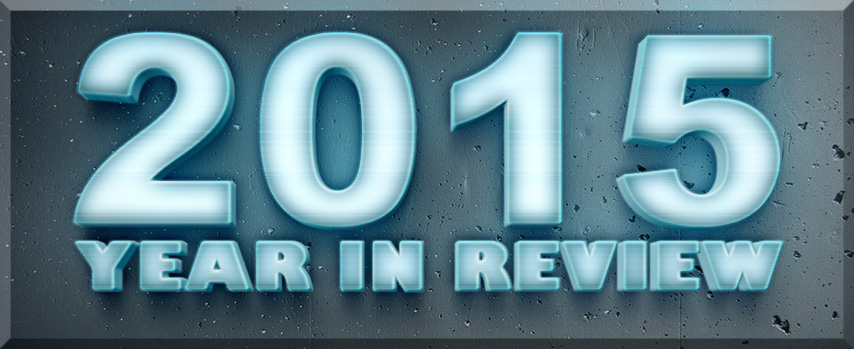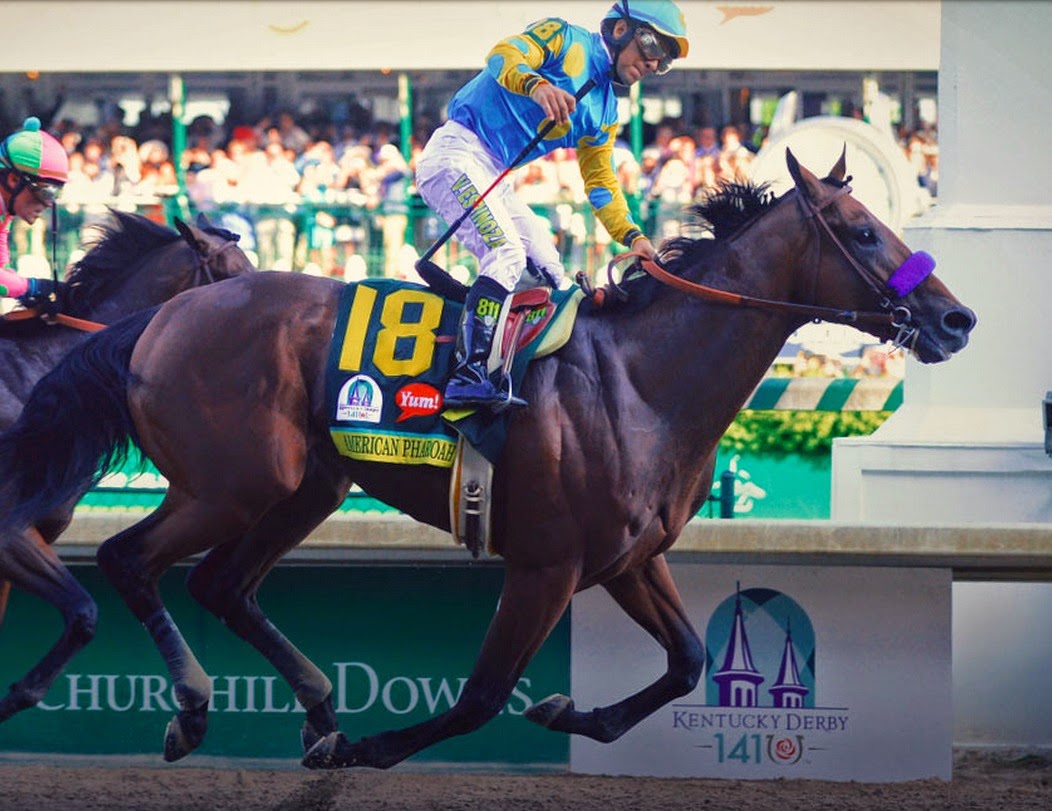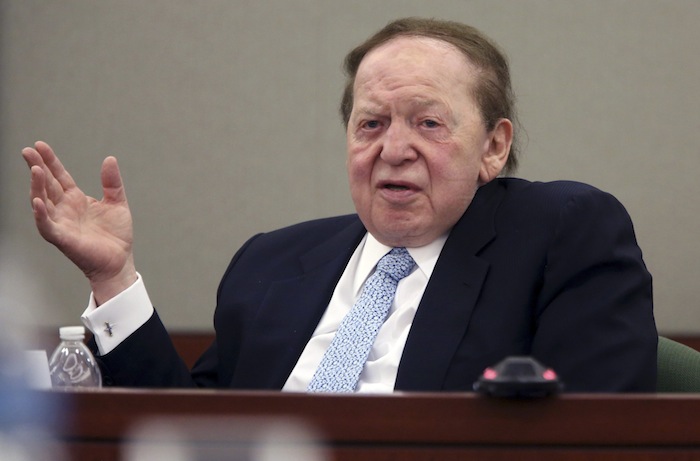There is no denying that the gambling business is an action-packed industry with a host of colorful characters and companies. Fantasy sports filled many blogs, newspapers and airtime in 2015, but the news didn't end there. Hartley Henderson lists his top 10 gambling stories of the year, with this piece covering the top four stories. To read the rest of the top gambling stories in North America for 2015, click here.

# 4 - American Pharaoh's Triple Crown win.
I usually don't include anything about sports in the top gambling stories but American Pharaoh's Triple Crown win deserves to be mentioned. Horse racing in North America has been suffering for some time now for various reasons, including the proliferation of other more "modern" forms of gambling, negative news about breakdowns and horse slaughter, and, of course, the lack of a super horse. Every time it appeared that some horse was ready to break the Triple Crown drought the horse always lost the last leg and in some instances, such as with Barbaro, the story ended in tragedy which instantly caused all the built up buzz to dissipate.
This year it was different.
 American Pharaoh was clearly a super horse in a relatively week year for 3 year olds and there was a belief he could finally break the trend and end the Triple Crown drought that has existed since Affirmed won in 1978. American Pharaoh won the first 2 legs of the series, but it didn't appear that there was all that much excitement about American Pharaoh leading up to the Belmont Stakes. Much of this was due to the fact that the Triple Crown races had been relegated to ESPN from major networks on television and some of it, I suspected, was a dislike for the owner Ahmed Zayat who was outed as a deadbeat gambler. Nevertheless American Pharaoh did win the Triple Crown and surprising to many in the industry that win sparked a whole new interest in horse racing stateside. Several racetracks indicated a spike in wagering for some time after American Pharaoh's Belmont Stakes win and Bloodhorse magazine wrote a story indicating that his victory sparked a whole new set of fans and interest in the sport. This was culminated when American Pharaoh won the Breeders Cup Classic in a romp and consequently was named AP's Sports Story of the Year.
American Pharaoh was clearly a super horse in a relatively week year for 3 year olds and there was a belief he could finally break the trend and end the Triple Crown drought that has existed since Affirmed won in 1978. American Pharaoh won the first 2 legs of the series, but it didn't appear that there was all that much excitement about American Pharaoh leading up to the Belmont Stakes. Much of this was due to the fact that the Triple Crown races had been relegated to ESPN from major networks on television and some of it, I suspected, was a dislike for the owner Ahmed Zayat who was outed as a deadbeat gambler. Nevertheless American Pharaoh did win the Triple Crown and surprising to many in the industry that win sparked a whole new interest in horse racing stateside. Several racetracks indicated a spike in wagering for some time after American Pharaoh's Belmont Stakes win and Bloodhorse magazine wrote a story indicating that his victory sparked a whole new set of fans and interest in the sport. This was culminated when American Pharaoh won the Breeders Cup Classic in a romp and consequently was named AP's Sports Story of the Year.
If interest in American Pharaoh can carry forward to 2016 and beyond, this could prove to be the turning point for an industry that was for all intents and purposes on its last legs in the U.S.
#3 - The possible end of RAWA.
Sheldon Adelson has been a noose around the neck of online gamblers for a while. Even though Adelson makes a fortune from gambling via the various casinos owned by the Las Vegas Sands Corporation he has been on a mission to have online gambling banned in the United States. At first Adelson was in favor of online gambling, but then realizing he could never compete online with the likes of Caesars or MGM he instead chose to petition to have the activity banned to protect his land based casinos. Adelson's efforts include forming a group called The Coalition to Stop Internet Gambling and setting up a website to explain "the dangers of online gambling", which according to him are worse than at land based facilities. And he has elicited support from significant politicians to create bills to ban online gambling which was called Restoration of America's Wire Act (RAWA).
Jason Chaffetz from Utah introduced the bill in the House and Lindsay Graham from South Carolina introduced the companion bill in the Senate. The bill hopes to return the U.S. to a time of confusion (prior to 2002) when the DoJ mistakingly believed that the Wire Act applied to online gambling and to all activities including casinos and poker. In 2002 the courts ruled the Wire Act applied only to sports gambling and in 2011 the DoJ affirmed that opinion but Adelson wants those rulings ignored or reversed.
As hypocritical and ludicrous as those bills are they appear to have been gaining support in both Houses on Capitol Hill and among various groups, particularly faith based groups. Adelson had hoped that the new groundswell of support and his significant contributions to campaigns in an election year would convince the new President, particularly if they are Republican, to sign RAWA into law once they are elected. But first he and Chaffetz had to show that there was overwhelming support for it.
The first step was to hold an information only hearing of The House Oversight and Government Reform Committee. The House is overwhelmingly Republican, so there was some belief that the hearing would be a love fest for RAWA and for Adelson. Instead it turned into a bi-partisan attack against the bill.
 Members from Nevada and New Jersey called Adelson's stated concerns about geo-location and access to minors ridiculous, pointing out that those states, which have legal online gambling, have had no trouble blocking people outside of the state nor have there been any instances where minors have been able to set up accounts. And stated concerns about money laundering and problem gambling were debunked by those who suggested that those issues are far more prevalent at land based casinos like The Sands than online. But the most common cry from both Republican and Democrat members was that RAWA violated the 10th amendment on state rights and that the House committee and politicians trying to introduce RAWA were overstepping their bounds by introducing a law that has always been a right of the states. Almost in unison committee members said this was a state decision and not Adelson's, Chaffetz's or Graham's. Utah already doesn't allow any form of gambling but Utah shouldn't decide for Oregon how they should behave. And of the 50 AGs only 8 currently support RAWA and the vast majority of the House apparently opposes it also.
Members from Nevada and New Jersey called Adelson's stated concerns about geo-location and access to minors ridiculous, pointing out that those states, which have legal online gambling, have had no trouble blocking people outside of the state nor have there been any instances where minors have been able to set up accounts. And stated concerns about money laundering and problem gambling were debunked by those who suggested that those issues are far more prevalent at land based casinos like The Sands than online. But the most common cry from both Republican and Democrat members was that RAWA violated the 10th amendment on state rights and that the House committee and politicians trying to introduce RAWA were overstepping their bounds by introducing a law that has always been a right of the states. Almost in unison committee members said this was a state decision and not Adelson's, Chaffetz's or Graham's. Utah already doesn't allow any form of gambling but Utah shouldn't decide for Oregon how they should behave. And of the 50 AGs only 8 currently support RAWA and the vast majority of the House apparently opposes it also.
The surprising condemnation in the hearing and the fact that so many perceived friends have turned against Adelson had the Poker Player's Alliance announcing that this hearing could be the beginning of the end for RAWA. No doubt Adelson will continue to push RAWA anyways but the hearing clearly shows that the billl doesn't have nearly the momentum that Adelson or many industry pundits previously believed.
#2 - Eric Schneiderman suit to ban DFS in NY state.
While clearly related to #1 the issue is different in many ways. Following the revelations of the daily Fantasy Sports (DFS) scandal, New York State Attorney Genereal Eric Schneiderman began to investigate DFS and its legality. At first Schneiderman stated that the DFS scandal was a form of fraud and he demanded to know more about which employees have access to what and how they use that information, but the next month he focused on the product itself. His concern was no longer about whether the DFS sites committed fraud, but rather whether DFS was legal in New York. And after some investigation he determined that DFS is a clear form of gambling and issued a cease and desist order against both sites from operating in the state of New York.
FanDuel agreed to block New York residents from playing, but DraftKings continued to allow New Yorkers to play. It is believed the Fantasy Sports Trade Association worked it out this way for strategic purposes. To simply concede New York as a no go zone would have a significant impact on revenues and it would set a dangerous precedent. So living up to his threat Schneiderman filed a suit in county court to force an injunction on the DFS sites arguing that New York law prohibits any activity that relies to a material degree on chance, regardless of the fact that the skill of the contestants may also be a factor and DFS clearly falls into that category. The lawyers for the fantasy sites argued that DFS is a form of skill and is exempted under the UIGEA.
Both parties made their case before Judge Mendez in the New York District Court and Mendez said he would have a decision soon. There was a hope it would be decided before New Year but it likely won't be decided until January now. While Mendez didn't indicate which side he was favoring, he did state that it appears the real skill is not with the DFS players who submit their picks against an arbitrary salary cap, but rather with the sports players themselves, which seems to suggest he has a slight lean towards Schneiderman's position. The reason this lawsuit is so significant is that the decision in this case could determine the future of DFS in the United States as a whole. Some states have already banned it s uch as Arizona, Louisiana, Nevada, Iowa, Montana, Washington and Nevada; other states have indicated they want to legalize and regulate it such as Massachusetts; but the majority of states are undecided. And according to industry experts I spoke to most of those undecided states are awaiting this court's decision before deciding how to proceed. A lot of states apparently are hoping to make deals with DFS sites to help bolster state revenues but they don't want to make any moves that will violate any laws. More importantly the U.S. Department of Justice is also awaiting this decision to determine if DFS is a violation of PASPA. That is why this story is so significant and rates #2 on the list.
uch as Arizona, Louisiana, Nevada, Iowa, Montana, Washington and Nevada; other states have indicated they want to legalize and regulate it such as Massachusetts; but the majority of states are undecided. And according to industry experts I spoke to most of those undecided states are awaiting this court's decision before deciding how to proceed. A lot of states apparently are hoping to make deals with DFS sites to help bolster state revenues but they don't want to make any moves that will violate any laws. More importantly the U.S. Department of Justice is also awaiting this decision to determine if DFS is a violation of PASPA. That is why this story is so significant and rates #2 on the list.
If Schneiderman loses his suit then look for a slew of states to start regulating DFS including taking a share of the profits. If Schneiderman wins his case look for the majority of states to ban DFS and possibly spell the end of the industry in the U.S. In fact the Illinois AG just announced that DFS was illegal in that state and the DFS sites have responded by suing the AG for that opinion.
#1 - The DraftKings scandal.
Without question this is the biggest story of 2015. While the incident itself was significant, the fallout and damage to the industry as a result of the scandal was far more significant. The incident occurred in October when Ethan Haskell, an employee at DraftKings inadvertently leaked the picks off all DraftKing players in their main NFL contest prior to the start of the 3rd week of NFL games. This was deemed a gross oversite since players can change their picks up until the start of the games. This left many customers of the site wondering if knowledgeable players used this information to gain an advantage. Haskell admitted the incident on Twitter, but he played it off as an oversight that wouldn't be repeated. Most in the industry seemed prepared to forgive the indiscretion but then some mainstream outlets including Forbes and the New York Times looked into the incident and into Haskell and determined that there was something far more concerning that needed to be addressed, namely that Haskell had won $350,000 at FanDuel, a competing site playing in their NFL contest. And when the issue was examined further it was revealed that many workers at DraftKings and FanDuel often played at the competing site and won. Industry analysts and gambling lawyers equated that to being no different than insider trading.
According to the analysts if someone knew who other DFS players were picking then those with the knowledge would win with unreasonable frequency. And as Haskell demonstrated with the leak it was easy for employees to get information on who players were picking what contests on their sites before those contests closed. Naturally employees couldn't play in their own contests but that didn't take away from the significance of the breach. Since DraftKings and FanDuel offer similar contests with similar players and salary caps, employees at one site can use that information of picks on their own site to guess what is being picked at the competing site. Both DraftKings and FanDuel issued a statement via the Fantasy Sports Trade Association to indicate that there was no wrongdoing on the part of any of their employees and also stated they would prohibit their personnel from playing any contests at either site from there on out. In additiona, an independent auditor was hired to show that Haskell did not use any insider information to win the $350,000 at FanDuel. But it was too little too late. Fantasy Sports players were angry and didn't believe the reports leading to calls for action on their part nor did they believe that simply banning employees from playing any fantasy sports would make a difference because they could still leak information to families or friends and use them as proxies. But more importantly it got the attention of the states and specifically the attorney generals within those states to examine DFS more closely.
Prior to October Fantasy Sports was in the news only because of how successful it was. Leagues were jumping at the opportunity to form strategic partnerships with the DFS sites to generate revenue and even within the NFL, which strongly opposes all forms of gambling, individual teams had agreements with the daily fantasy sports sites for advertising. It seemed like everyone in the sports industry just accepted that daily fantasy sports was legal because of the exemption in the UIGEA and they were looking for a way to capitalize. There was no real regulation in the industry which made it that much more intriguing to the DFS players and both FanDuel and DraftKings were seeing profits that were almost unimaginable. The only question seemed to be how big DFS would get.
But once the scandal hit . . . everything changed.
There were immediate calls for regulation in some states, there were calls by the leagues to start looking at the partnerships more closely and most concerning to the industry there were calls by attorney generals in at least 2 states to determine whether DFS was really a game of skill or whether it was indeed just a hidden form of gambling. Suddenly DFS was not on the radar because of its success but rather it was on the radar because the legality of the product was being called into question. Since the scandal at least 2 lawsuits were started by players, a new law was put in place by Nevada banning DFS and a suit was filed by the state of New York to ban the activity (to be discussed in detail later as a different story). Moreover, several states started rushing to put in place efforts to either regulate it or consider banning it. And the unprecedented growth of DFS came to a sudden halt. Entries at DFS sites declined greatly and at least 2 class action lawsuits have been initiated against both FanDuel and DraftKings.
What looked to be an innocent error suddenly brought the whole area of DFS under scrutiny and possibly even the beginning of its demise in the United States and for that reason alone the DraftKings scandal is the top story of 2015.
To see the rest of Hartely's top gambling stories in North America for 2015, click here.
Read insights from Hartley Henderson every week here at OSGA and check out Hartley's RUMOR MILL!







































